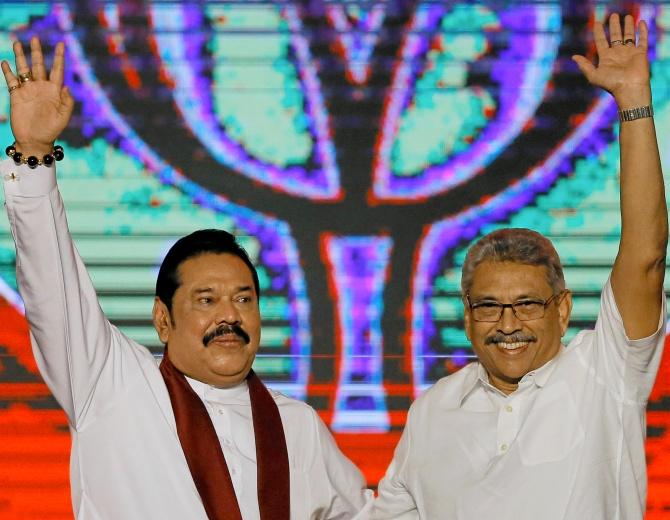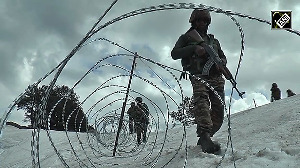'Rajapaksa's victory poses a serious foreign policy challenge for the Modi government,' notes Ambassador M K Bhadrakumar.

Gotabaya Rajapaksa's thumping victory in the Sri Lankan presidential election on Saturday, November 16, trouncing his nearest rival Sajith Premadasa by a margin of over 1.3 million votes -- 52.25% of votes polled against 41.99% -- is without doubt an assertion of Sinhala nationalism.
There has been a manifest polarisation of the Sri Lankan electorate on religious and ethnic lines.
If a 'communal map' of Sri Lanka is placed alongside the 'electorate map', the regions where Rajapaksa polled heavily almost entirely overlaps the regions where Buddhists form a big majority of the population. On the contrary, he lost heavily in the regions where Hindus and Muslims dominate.
Ironically, Premadasa did not win a single electoral district where Buddhists are in a majority, whereas he won hands down in the Tamil and Muslim regions.
The polarisation is indeed very sharp when we look at the voting pattern in the electoral districts in the Tamil and Muslim regions of the north, northeast and the east of the country:
Jaffna: Premadasa (83.86%), Rajapaksa (6.24%); Vanni: Premadasa (82.12%), Rajapaksa (12.27%); Trincomalee: Premadasa (72.1%) , Rajapaksa (23.39%); Batticaloa: Premadasa (78.7%), Rajapaksa (12.68%); Digamadulla: Premadasa (63.09%), Rajapaksa (32.82%); Nuwaraeliya: Premadasa (58.28%), Rajapaksa (36.87%)
Wherever significant Sinhala population exists in the northern and eastern electoral districts -- Trincomalee, Digamadulla and Nuwaraeliya -- Rajapaksa fared relatively better.
On the other hand, just look at the groundswell of support for Rajapaksa uniformly in all the Sinhala Buddhist electoral districts of the south, west, and central provinces: Hambantota (66.17 votes polled); Matara (67.25%); Galle (64.26%); Monaragala (65.34%); Ratnapura (59.93%); Kalutara (59.49%); Badulla (49.29%); Kegalle (55.66%); Gampaha (59.28%); Colombo (53.19%); Kandy (50.43%); Matale (55.37%); Kurunegala (57.90%); Puttalam (50.83%); Polonnaruwa (53.01%); and, Anuradhapura (58.97%).
This sort of acute religious/communal/ethnic polarisation is fraught with deep implications for the country. Quite obviously, Rajapaksa has been vehemently rejected by the Tamil and Muslim minorities, while the Christian church, on the contrary, appears to have adopted a pragmatic attitude.
Prima facie, Sri Lanka is getting a new government that bears striking resemblance to India's -- riding the wave of cultural nationalism.
If India's ruling elite has a tendency to define its nationalist ethos in terms of Pakistan and the Hindu rashtra, the average Sinhala Buddhist nationalist, especially in the heartland of the deep south, who sees his country as the last remaining citadel of Theravada Buddhism, defines himself against India and the Hindu religion.
Put differently, the RSS's assumption that it is possible to establish an overarching affinity between India and Sri Lanka on the bridge of cultural nationalism stands badly exposed as naïveté.
The return of the Rajapaksa family to power is a blow to India's prestige.
An impression formed somehow that an Indian-American conspiracy dethroned the Mahinda Rajapaksa government in 2015 in a 'regime change' project. That impression refuses to go away. It lies dormant in the sub-soil.
Meanwhile, in the collective Sinhala Buddhist consciousness, the vote for Gotabaya Rajapaksa is a vote for the stability and independence of the country free of foreign domination. No doubt, the terrorist attacks last year fuelled the xenophobia that led to this tsunami of support for Rajapaksa.
The Sri Lankan Tamil community stands to lose heavily. Dispossessed by the ruling elite in Colombo and disowned by the ruling elite in Delhi, the Sri Lankan Tamil is today left to fend for himself. Hard times lie ahead for him.
When majoritarianism surges, as happened also in India, the minorities take the hit.
There is no way Rajapaksa will accept federalism in Sri Lanka. The Tamil community will have to come to terms with the grim implications of it and learn to live with what is on offer. Delhi is unlikely to champion his cause.
Clearly, Rajapaksa's victory poses a serious foreign policy challenge for the Modi government. An honest rethink and a drastic course correction is called for. The Modi government's proclivity to put 'favourites' in power in the neighbouring capitals is plainly unsustainable.
That approach failed in Nepal and now in Sri Lanka.
It is small comfort that Delhi deals with a 'pro-Indian' politician in power in Male. In fact, the very idea of defining politicians in neighbouring countries as 'pro-India' or 'pro-China' is a bogus attempt. Delhi should emulate China's example and learn to deal with whosoever comes to power in the neighbouring countries.
The Western media will whip up paranoia that Sri Lanka is about to move into the 'Chinese orbit' and so on. Many Indian analysts will lap it up without realising that China may have legitimate interests in the South Asian region and its actions are not necessarily 'India-centric'.
Having said that, Delhi may have to reconcile with the geopolitical reality that Rajapaksa will give a level playing field to China.
Under the new Rajapaksa dispensation in Colombo, a significant expansion of Chinese presence in Sri Lanka can be expected, given China’s financial muscle and aggressive business practices.
However, at the end of the day, trust the Sri Lankan elite to preserve the country's sovereignty and independence. Tough politicians like Rajapaksa cannot be pushed around because they are 'sons of the soil; and China would know that well enough.
The bottom line is that Rajapaksa will be no less a 'strongman' than Prime Minister Modi. It will be exceedingly foolish to adopt a prescriptive attitude toward the Rajapaksa government. Any such attempt will meet with rebuff. Success lies in carrying Rajapaksa along.
Modi has done well to be the first world leader to congratulate Rajapaksa even before the counting of votes was completed and results were formally announced in Colombo. Modi expressed the hope that he and Rajapaksa could work closely together 'for deepening the close and fraternal ties between our two countries and citizens, and for peace, prosperity as well as security in our region.'
The heart of the matter is that India cannot choose its neighbours. In the prevailing multipolar world order, countries, big and small, gain strategic depth by diversifying their external relations so as to safeguard their perceived core interests and vital concerns from being buffeted by superior powers.
Indian diplomacy should, therefore, focus on identifying and enhancing congruent interests and common concerns with Colombo.
Being Sri Lanka's only neighbour, India has very many latent advantages if only they are tapped with patience and prudence and avoiding overbearing attitudes.
Of course, a zero sum mindset will only prove deleterious.











 © 2025
© 2025